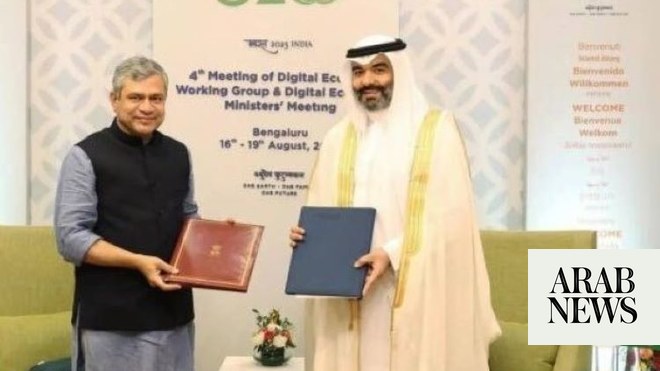
RIYADH, JEDDAH: Senior government officials from five countries have banded together to launch a new global organization with the aim to strengthen cooperation across all innovation-driven areas and accelerate the growth of the digital economy.
Dubbed the Digital Cooperation Organization (DCO), the participating nations in the initiative are Saudi Arabia, Bahrain, Jordan, Kuwait and Pakistan.
The DCO aims to strengthen collaboration among member nations as they adapt to a global economy increasingly defined by technological innovation.
Abdullah Al-Swaha, Saudi minister of communications and information technology, spoke about the importance of the event and the necessity of banding together to fortify the digital economy.
“We are joining hands together toward a commitment to drive consensus on digital cooperation to make sure that we seize an opportunity for our youth, our women and our entrepreneurs with the ambition to grow our combined digital economy to $1 trillion in the next three to five years,” he said.
He added: “Our future prosperity will depend on the digital economy, but it can only reach its full potential if we are able to make governments work together collectively with businesses and entrepreneurs so they can survive and thrive, expand their depth into current markets and open doors for everyone into new ones.”
One of the things the world had learned in 2020, the minister said, is that economies are as strong as their digital economies.
The DCO was announced in a digital launch event on Thursday evening, which was attended by several big names in the field, such as International Telecommunication Union Secretary-General Houlin Zhao, and President of the World Economic Forum Borge Brende.
Brende stressed the government role in fueling the digital economy, “I think the GCC countries and governments have been extremely successful in doing so; they set up a lot of funds. They injected a lot of funds into startups and helped them really grow and led to the different success stories that we hear about today.”
Zhao insisted that government institutions must no longer work separately, and that the world needed to have a holistic approach to facilitate and encourage ICT developments to better serve the digital economy.
“We encourage regulators to work with the other sectors to try to create a good environment to facilitate that ICT development,” he said.HIGHLIGHT
• The event also featured a group of leading private-sector startup founders from the region who discussed their role in driving digital transformation.
• They shared opinions on potential opportunities in crowdsourcing ideas, and innovations between governments and the public — as well as challenges regarding regulations, workforce skills, global competition, infrastructure and funding.
Zhao also highlighted Saudi Arabia’s efforts during its presidency of the G20. However, without action based on all the good statements and declarations announced, there would not be much change, he said.
The event also featured a group of leading private sector startup founders from the region who discussed their role in driving digital transformation. They shared opinions on potential opportunities in crowdsourcing ideas, and innovations between governments and the public — as well as challenges regarding regulations, workforce skills, global competition, infrastructure and funding.
Panelists also highlighted the necessity of working together, whether between the different institutions within each country or between governments on the global level, to overcome hurdles and begin to envision a more resilient shared future.
“I think everyone now is aware of the impact of COVID-19 on the economy in general. But what we’ve seen this year was actually a very positive gear toward accelerating the digital economy,” said Abdulhameed Shararah, the founder and CEO of RiseUp. “Because I think what governments and investors and corporations had wished to happen in 10 years or 15 years from now has actually kick-started super fast.”
It had also had a massive impact on the culture of acceptance of technology on both people and at the government level, he added.
The Saudi vice minister of communication and information technology, Haytham Al-Ohali, announced that Saudi Arabia will be building on this year’s digital economy roundtable efforts to establish and lead an annual digital economy forum to discuss key opportunities and challenges facing the sector.
This will convince governments and stakeholders to work together to make sure that policymakers are driving the global digital economy through sustained growth while ensuring prosperous societies.
The event also featured CEOs, entrepreneurs and other experts contributing their opinions in a multi-national, digital roundtable during which they discussed the future of the digital economy.











